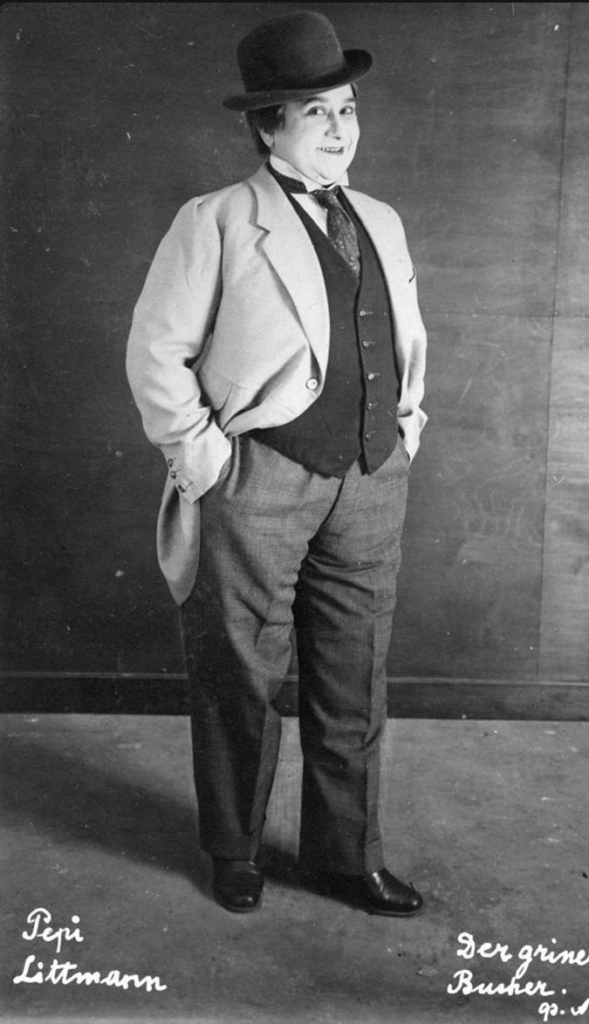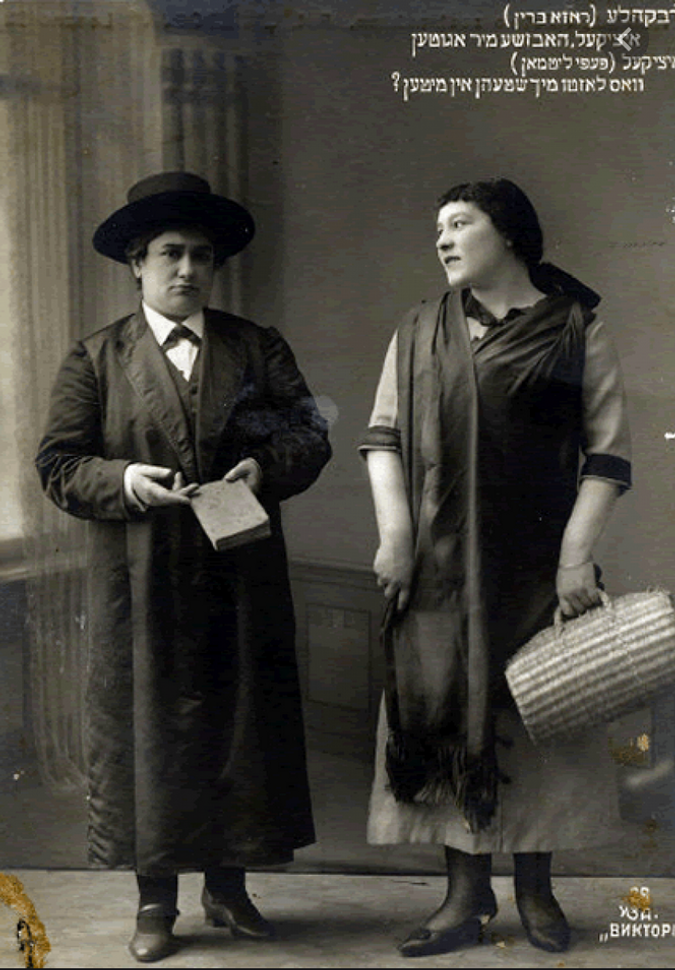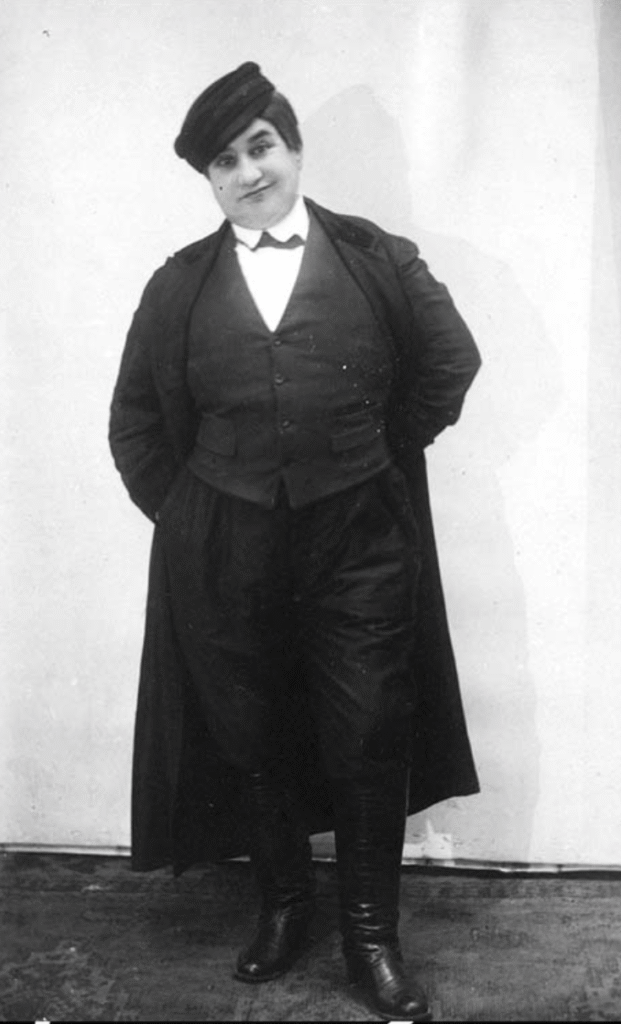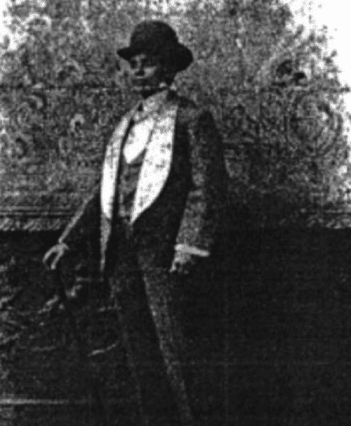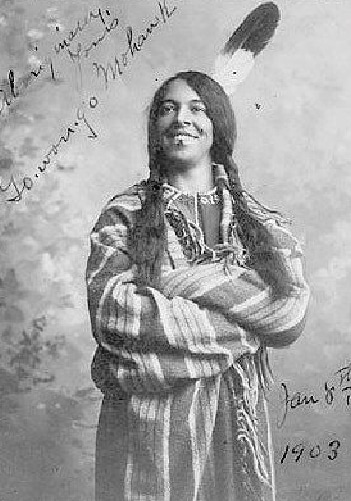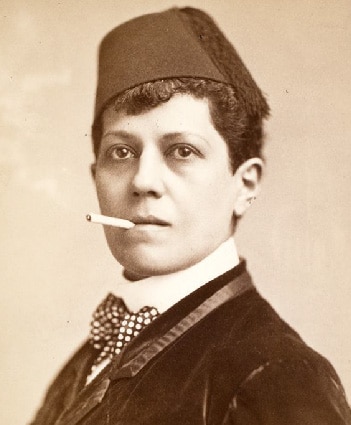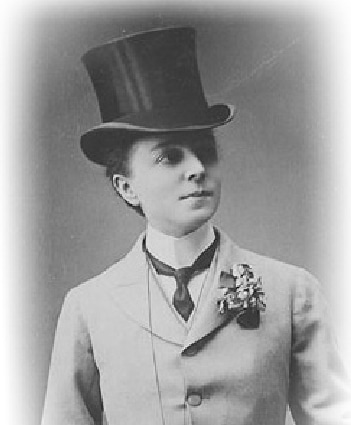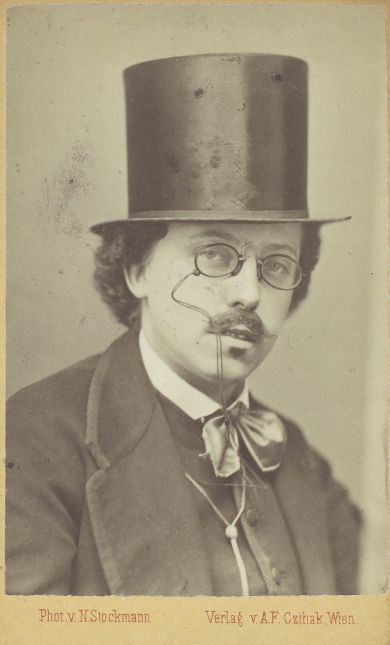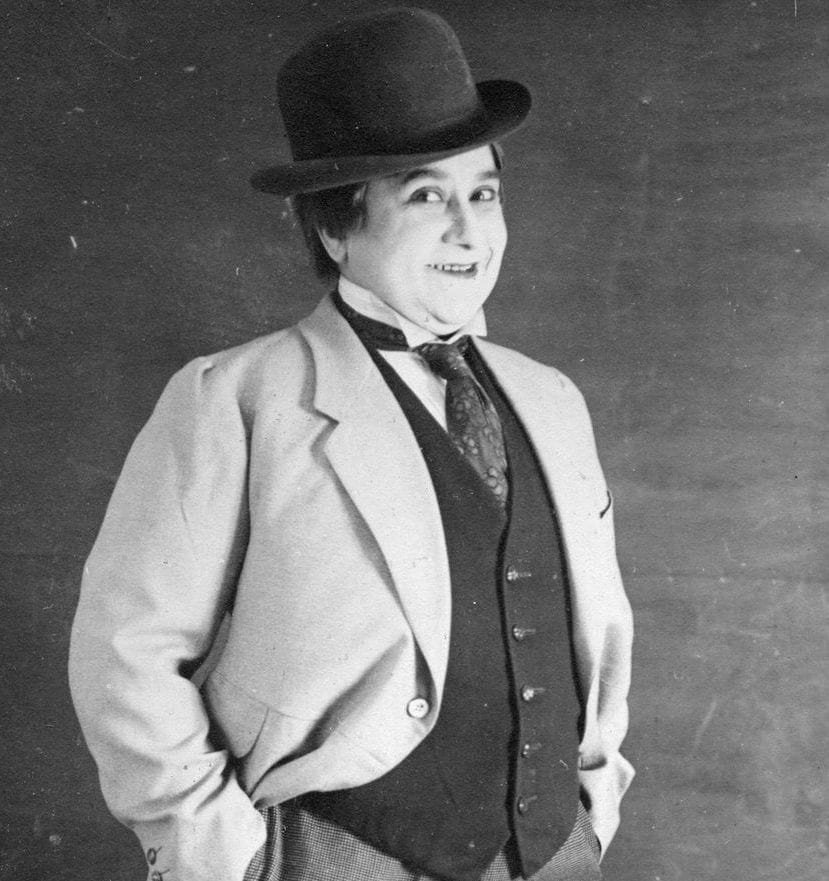
Years active
c. 1890 – 1930
Stage Name(s)
Pepi Littman
Category
Male Impersonator
Country of Origin
UKRAINE
Birth – Death
c.1874 – 1930
Bio
Pepi Littmann was a popular Galician Jewish male impersonator, singer and variety show performer in late 19th century Austria-Hungary. Littmann was particularly well known for her breeches roles, in which she often appeared as a Hasidic Jew or a rabbi to poke fun at strict Orthodox gender roles. She recorded numerous 78rpm records which attest to her talent and joyous nature. In 2021, the short film Make Me A King premiered bringing exposure and recognition to Littman.
Pepi Littman was born Pesha Kahane circa 1874 in Tarnopol, Eastern Galicia (today Ternopil, Ukraine). Her family was poor, and as a teenager, Littman had to work as a maid. She found employment in the home of the family of the future American actor Max Badin, where she was first introduced to the performing arts.
Littmann likely met the traveling singing and variety troupe known as the “Broder Singers,” named after Berl Broder (1817–1868), at the Badin house. She joined them on tours through Galicia and Romania and quickly became a favorite with audiences. She was particularly successful with her trouser roles, in which she appeared, among other things, as a Hasidic Jew and satirized strictly orthodox gender roles. While traveling, Littmann herself adhered to religious precepts as much as possible, eating kosher and observing Shabbat.
In Czernowitz, she married fellow actor Yankel Littmann (dates of birth and death unknown) and gradually took over the management of the troupe. Even on later tours with traveling variety shows, she was always placed at the forefront and celebrated in the press as an “exquisite attraction.” [1] Littmann performed in spa towns such as Marienbad and Karlsbad, and experienced “true triumphs” [2] in major cities like Warsaw, Krakow, Lviv, Odessa, Budapest, and Vienna; a tour in 1906 even took her to New York City. In Vienna, Littmann performed at venues including the Volks-Orpheum Rothensterngasse and the Theater Reklame . At the Theater Reklame, Littmann appeared alongside the theater stars of the time, Esther Perelman (1898–1966) and Isaak Deutsch (1884–1934), in the play “The Merry Scroungers.”
The audience was a mix of Jewish and non-Jewish, but definitely mostly from the working class. The historian and playwright Sholem Perlmutter (1884–1954) described the working conditions of the Broder Singers: “The profession of a Yiddish folk singer did not enjoy any particular prestige at that time. There were many pubs in Lviv then, frequented by the lower classes of the Jewish people, and there […] the ‘Broder Singers’ would come with their ‘little songs.’ […] On the evenings when the Broder Singers performed, a special, distinctive red lamp was hung outside the pub, on which was written in Yiddish letters: ‘Tonight the best Jewish folk singers are performing in this pub.’ […] In a pub where Broder Singers performed, the first thing that drew attention was two large brass candlesticks on a wide, large table, as a sign that this was where the stage began, which was never separated from the audience. […] Admission to the ‘Broder Singers’ was free, but after each couplet or song, the singers left with a Plates were passed through the audience, and they collected their own wages, which usually amounted to no more than two or three kreuzers from each person.” [3] The singers also received a fee from the innkeepers.
During the First World War, Littmann remained in Odessa, where she moved in artistic and literary circles. She was a frequent guest of the Yiddish writers David Frischmann (1859–1922) and Mendele Moicher Sforim (1836–1917), who praised her self-penned songs. After the Russian Revolution of 1917, Littmann was forbidden from performing her repertoire in the USSR, even though it included songs critical of capitalism and, according to her lyrics, Littmann sympathized with socialism. In the song “Harbe Schale,” for example, the passage “Let me ask you a little question…” is repeated, and the answer is always “Money!” [4] At a currently unknown date, Littmann married the Kyiv-born actor and theatre director Lazar Olschansky, who is mentioned as a widower in the press release about Littmann’s funeral.
In 1928, Littmann embarked on a final tour with stops in Poland, Vienna , Karlovy Vary (Carlsbad), Mariánské Lázně (Marienbad), Poland, and again Vienna. This tour, however, took a heavy toll on her health; during her second stop in Vienna, she became seriously ill and was treated for some time at the Rothschild Hospital in Währing . Littmann died there on September 13, 1930. Her funeral was financed by the Jewish Actors’ Association of Vienna, and the burial plot was donated by the Jewish community of Vienna.
Jacob Mestel, co-editor of the “Leksikon fun Yidish Teater”, knew Pepi Littmann personally and often met with her variety troupe. In the encyclopedia, he wrote of Littmann as “probably the only typically Jewish singer in Hasidic trousers,” who delighted audiences with her contralto voice and her “vulgar charm.” [5] He also notes that she was the first to engage foreign-language singers for her ensemble, depending on local requirements: German- and Polish-speaking singers in Galicia and Bukovina, and German- and Hungarian-speaking singers in Hungary, with whom she performed abridged plays. Littman described her usual stage attire as follows: “Velvet hat over her side curls around her round, full female face, in a wide, unbuttoned coat, short trousers, white socks and slippers, with both hands under her curls or on her hips, she would appear from behind the curtains with a song, and at that moment the audience would light up as if struck by lightning, and everyone would recognize the tune and sing along with her.” [6]
The British-Jewish journalist M.J. Landa, writing in the newspaper “The Jewish World” in 1910, called Littmann “the embodiment of the cheerful spirit of the Jews, with elements of feeling and pathos. As I listened to her sing […] an amusing little song about the Messiah returning in an automobile, I forgot that I was in Galicia—forgot the terrible, depressing poverty that had surrounded me for the past few days.” [7]
In a 1930 obituary published in newspapers in Lodz and London, journalist Shmuel Hochberg paid tribute to Littman as follows: “Pepi Littman, with her cheerful acting style and distinctive folk singing, striding across the stage in men’s trousers and her Galician Hasidic cap, almost always evoked a peaceful mood in Yiddish audiences. Although she herself said that she had no formal education, she gave the impression of being an educated woman in society, as she essentially spoke a universal language. Despite her life as an artist, Pepi Littman was religiously inclined, as evidenced by her lighting Sabbath candles on Friday evenings, avoiding non-kosher food, and observing religious customs applicable to Jewish women.” [8]
Littman’s performance resonated particularly well with a recently urbanized Jewish audience that had turned away from the religiously defined life of the shtetl. For an audience (especially women) that had chosen to escape rabbinical authority and strict rules of conduct, particularly regarding gender roles, Littman’s parodies of Hassidic men must have felt both familiar and liberating. Activist Rosza Daniel Lang/Levitsky explains that Littmann’s performances allowed the audience to “experience the pleasure of hearing (and perhaps even singing along to) the traditional prayer, with its beautiful melody, carried by Littmann’s clear and skillful delivery—without having to acknowledge any power or authority to the theocratic system in which it was embedded. Material from the religious tradition, be it a prayer, a melody, or a stylistic device, was transformed by the new framing from something potentially threatening to a source of pleasure.” [9] With double entendres, sexual innuendo, and plenty of risqué humor, Littmann’s rabbinic stage persona broke all taboos. In one song, for example, she brazenly sang about the length of the rabbi’s sacred Havdole ceremony, altering the pronunciation to deliver a risqué joke.
Researcher Alyssa Quint at the YIVO Institute of Jewish Research elaborates on the interplay of gender and sexuality: “Littman’s cross-dressing was particularly provocative and subversive because it imitated the mannerisms of Hasidic rebbes. It was not simply a mockery of Hasidism. It was an assertion of a woman’s right to participate in every aspect of Jewish theatrical art.” [10]
Littman’s musical work has been extensively documented, as many 78 rpm records of her songs were recorded.
In 2021, the film Make Me A King [11] premiered to critical acclaim winning several notable film and festival awards. This short film recounts the fictional story of Ari, a Jewish drag king rejected by her family who is enamored with Pepi Littman. This fictional story shines a spotlight onto Pepi Littman, one of the world’s most remarkable performers.
(Submitted by: Noah Rosa Mayr, Vienna, Austria)

